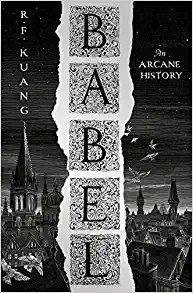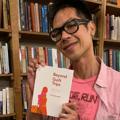Die Notwendigkeit von Gewalt
5 stars
Babel kommt mit einer spannenden Prämisse. Das Buch spielt in England des 19. Jahrhunderts einer alternativen Zeit und eine der stärksten Treiber für Innovationen sind "magische" Silberbarren. So fand man heraus, dass über Linguistik und Gravuren von verwandten Wörtern in unterschiedlichen Sprachen die Barren die Realität verändern können.
Das Buch folgt Robin Swift, einem chinesischen Jungen, der von Professor Lovell mit nach England genommen wird, nachdem seine Familie an Cholera starb und fast er selbst auch. Die Geschichte verfolgt seine Vorbereitung auf Oxford, das Zentrum des Wissens und Heimat des königlichen Instituts der Übersetzungen.
Robin lernt Freunde kennen, aber auch immer weiter die Zahnräder der Welt wie z.B. die Auswirkungen des Kolonialismus und Kapitalismus.
Besonders gefallen hat mir der Schreibstil. Er erzählt die Geschichte spannend, aber vermittelte mir auch leicht den akademischen Charakter. So gibt es kurze Erklärungen zu Wortpaaren, Fußnoten und Echtwelt-Einspielungen. Durch die Augen von Robin lernen wir …
Babel kommt mit einer spannenden Prämisse. Das Buch spielt in England des 19. Jahrhunderts einer alternativen Zeit und eine der stärksten Treiber für Innovationen sind "magische" Silberbarren. So fand man heraus, dass über Linguistik und Gravuren von verwandten Wörtern in unterschiedlichen Sprachen die Barren die Realität verändern können.
Das Buch folgt Robin Swift, einem chinesischen Jungen, der von Professor Lovell mit nach England genommen wird, nachdem seine Familie an Cholera starb und fast er selbst auch. Die Geschichte verfolgt seine Vorbereitung auf Oxford, das Zentrum des Wissens und Heimat des königlichen Instituts der Übersetzungen.
Robin lernt Freunde kennen, aber auch immer weiter die Zahnräder der Welt wie z.B. die Auswirkungen des Kolonialismus und Kapitalismus.
Besonders gefallen hat mir der Schreibstil. Er erzählt die Geschichte spannend, aber vermittelte mir auch leicht den akademischen Charakter. So gibt es kurze Erklärungen zu Wortpaaren, Fußnoten und Echtwelt-Einspielungen. Durch die Augen von Robin lernen wir die Vorzüge und gleichzeitig den Horror von Wohlstand des 19. Jahrhunderts kennen. Ich denke, die Aussage von Rebecca Roanhorse "A Masterpiece" ist nicht unbedingt übertrieben.
Ich hab noch Yellowface auf meiner Leseliste, aber bin nun auch gespannt auf weitere Romane der Autorin. :-)








